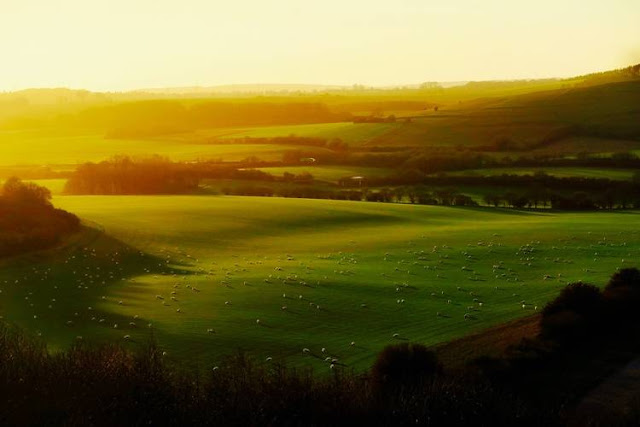"And he believed in the Lord; and he counted it to him for righteousness." Genesis 15:6
Genesis 15After these things the word of the Lord came unto Abram in a vision, saying, Fear not, Abram: I am thy shield, and thy exceeding great reward.And Abram said, Lord God, what wilt thou give me, seeing I go childless, and the steward of my house is this Eliezer of Damascus?And Abram said, Behold, to me thou hast given no seed: and, lo, one born in my house is mine heir.And, behold, the word of the Lord came unto him, saying, This shall not be thine heir; but he that shall come forth out of thine own bowels shall be thine heir.And he brought him forth abroad, and said, Look now toward heaven, and tell the stars, if thou be able to number them: and he said unto him, So shall thy seed be.And he believed in the Lord; and he counted it to him for righteousness.And he said unto him, I am the Lord that brought thee out of Ur of the Chaldees, to give thee this land to inherit it.And he said, Lord God, whereby shall I know that I shall inherit it?And he said unto him, Take me an heifer of three years old, and a she goat of three years old, and a ram of three years old, and a turtledove, and a young pigeon.And he took unto him all these, and divided them in the midst, and laid each piece one against another: but the birds divided he not.And when the fowls came down upon the carcases, Abram drove them away.And when the sun was going down, a deep sleep fell upon Abram; and, lo, an horror of great darkness fell upon him.And he said unto Abram, Know of a surety that thy seed shall be a stranger in a land that is not theirs, and shall serve them; and they shall afflict them four hundred years;And also that nation, whom they shall serve, will I judge: and afterward shall they come out with great substance.And thou shalt go to thy fathers in peace; thou shalt be buried in a good old age.But in the fourth generation they shall come hither again: for the iniquity of the Amorites is not yet full.And it came to pass, that, when the sun went down, and it was dark, behold a smoking furnace, and a burning lamp that passed between those pieces.In the same day the Lord made a covenant with Abram, saying, Unto thy seed have I given this land, from the river of Egypt unto the great river, the river Euphrates:The Kenites, and the Kenizzites, and the Kadmonites,And the Hittites, and the Perizzites, and the Rephaims,And the Amorites, and the Canaanites, and the Girgashites, and the Jebusites.
_______
"When the God of resurrection fills the vision there is no limit to the soul's blessing, for He who can quicken the dead, can do anything.
"And he believed in the Lord, and he counted it to him for righteousness."
The imputation of righteousness to Abraham is, here, founded upon his believing in the Lord as the Quickener of the dead. It is in this character that He reveals Himself in a world where death reigns; and when a soul believes in Him, as such, it is counted righteous in His sight. This necessarily shuts man out, as regards his co-operation, for what can he do in the midst of a scene of death? Can he raise the dead? Can he open the gates of the grave? Can he deliver himself from the power of death, and walk forth, in life and liberty, beyond the limits of its dreary domain? Assuredly not. Well, then, if he cannot do so, he cannot work out righteousness, nor establish himself in the relation of sonship. "God is not the God of the dead, but of the living," and, therefore, so long as a man is under the power of death, and under the dominion of sin, he can neither know the position of a son, nor the condition of righteousness. Thus, God alone can bestow the adoption of sons, and He alone can impute righteousness, and both are connected with faith in Him as the One who raised up Christ from the dead.
It is in this way that the apostle handles the question of Abraham's faith, in Romans 4, where he says,
"It was not written for his sake alone, that it was imputed to him; but for us also to whom it shall be imputed, if We believe on him that raised up Jesus our Lord from the dead."
Here, the God of resurrection is presented "to us also," as the object of faith, and our faith in Him as the alone ground of our righteousness. If Abraham had looked up into heaven's vault, spangled with innumerable stars, and then looked at "his own body now dead," how could he ever grasp the idea of a seed as numerous as those stars? Impossible. But he did not look at his own body, but at the resurrection power of God, and, inasmuch as that was the power which was to produce the seed, we can easily see that the stars of heaven and the sand on the sea-shore are but feeble figures indeed; for what natural object could possibly illustrate the effect of that power which can raise the dead?
So also, when a sinner hearkens to the glad tidings of the gospel, were he to look up to the unsullied light of the divine presence, and then look down into the unexplored depths of his own evil nature, he might well exclaim, How can I ever get thither? How can I ever be fit to dwell in that light? Where is the answer? In himself? Nay, blessed be God, but in that blessed One, who travelled from the bosom to the cross and the grave, and from thence to the throne, thus filling up, in His Person and work, all the space between those extreme points. There can be nothing higher than the bosom of God — the eternal dwelling-place of the Son; and there can be nothing lower than the cross and the grave; but, amazing truth! I find Christ in both. I find Him in the bosom, and I find Him in the grave. He went down into death in order that He might leave behind Him, in the dust thereof, the full weight of His people's sins and iniquities. Christ, in the grave, exhibits the end of everything human — the end of sin — the full limit of Satan's power. The grave of Jesus forms the grand terminus of death. But resurrection takes us beyond this terminus, and constitutes the imperishable basis on which God's glory and man's blessing repose for ever. The moment the eye of faith rests on a risen Christ, there is a triumphant answer to every question as to sin, judgement, death, and the grave. The One who divinely met all these, is alive from the dead; and has taken His seat at the right hand of the majesty in the heavens; and, not only so, but the Spirit of that risen and glorified One, in the believer, constitutes him a son. He is quickened out of the grave of Christ: as we read,
"and you, being dead in your sins, and the uncircumcision of your flesh, has he quickened together with him, having forgiven you all trespasses." (Col. 2:13)
Hence, therefore, sonship, being founded on resurrection, stands connected with perfect justification — perfect righteousness — perfect freedom from everything which could, in any wise, be against us. God could not have us in His presence with sin upon us. He could not suffer a single speck or stain of sin upon His sons and daughters. The father could not have the prodigal at His table with the rags of the far country upon him. He could go forth to meet him in those rags. He could fall upon his neck and kiss him, in those rags. It was worthy, and beautifully characteristic of his grace so to do; but then to seat him at his table in the rags would never do. The grace that brought the father out to the prodigal, reigns through the righteousness which brought the prodigal in to the father. It would not have been grace had the father waited for the son to deck himself in robes of his own providing; and it would not have been righteous to bring him in in his rags; but both grace and righteousness shone forth in all their respective brightness and beauty when the father went out and fell on the prodigal's neck; but yet did not give him a seat at the table until he was clad and decked in a manner suited to that elevated and happy position. God, in Christ, has stooped to the very lowest point of man's moral condition, that, by stooping He might raise man to the very highest point of blessedness, in fellowship with Himself. From all this, it follows, that our sonship, with all its consequent dignities and privileges, is entirely independent of us. We have just as little to do with it as Abraham's dead body and Sarah's dead womb had to do with a seed as numerous as the stars which garnish the heavens, or as the sand on the seashore. It is all of God. God the Father drew the plan, God the Son laid the foundation, and God the Holy Ghost raises the superstructure; and on this superstructure, appears the inscription, "THROUGH GRACE, BY FAITH, WITHOUT WORKS OF LAW'"
From Genesis 15
C. H. Mackintosh
Photo by Amador Loureiro on Unsplash











